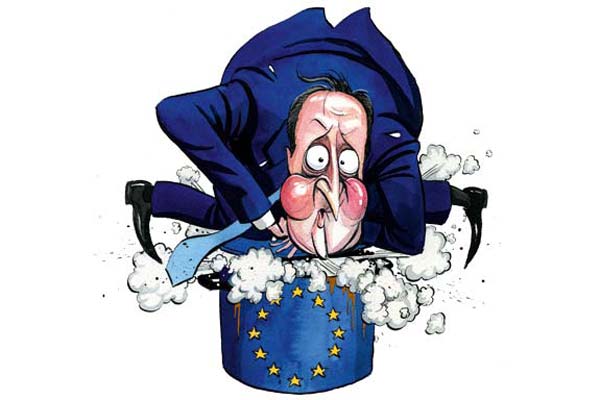By the time the G8 is next held in this country, the United Kingdom may well have left the European Union. In the next eight years, the question of whether Britain is in or out will be settled. We know that if David Cameron is Prime Minister after the next election, that decision will be made in 2017. But whoever is in No. 10, a referendum is coming. When it comes, the Tory party will have to decide whether it is for exit or staying in. Either way, it is hard to see the party staying together.
On Monday, we had a preview of the coming argument. David Cameron gave a speech declaring that EU membership ‘is not some national vanity; it is in our national interest’. This would have been relatively uncontroversial even during the bitterest period of John Major’s leadership. Now it’s news — because two senior Cabinet ministers, Michael Gove and Philip Hammond, have publicly declared that membership on the current terms is not in the national interest. Cameron’s speech also swam against an increasingly Eurosceptic tide of opinion in his party.
‘If he’s going to lead the “in” campaign,’ one senior Tory MP remarked to me, ‘I don’t think he can lead the party too.’ At least one loyalist fears that, if Cameron comes back from a Brussels renegotiation saying he’ll campaign to stay in, the chairman of the 1922 Committee will immediately receive enough letters to trigger a vote of no confidence.
The Labour leadership continue to hold out against a European referendum. It would dominate their time in office, and that prospect does not appeal. But even some members of Miliband’s circle know that the boil must be lanced at some point. They are canvassing opinion on calling for an instant in/out vote — which they could do by getting behind the forthcoming Tory private member’s bill. There would be a high-minded rationale: ‘ending the uncertainty’ about Britain’s position in Europe. The real motivation, however, would be to split the Tories between those who want a referendum now and those prepared to wait until after the renegotiation.
If Cameron wins the next election, he will have to begin the renegotiation immediately: he’ll only have 18 months to do it. But it is not clear what he’ll be able to bring back from Brussels. Those mandarins with the most experience of European treaty talks share Nigel Lawson’s view that significant concessions are simply not on offer.
The Tory leadership are sensitive on this point. They stress that rather than having a shopping list of powers they want back, their aim is to change the way the EU operates. William Hague has talked of a system to let national parliaments block European Commission proposals. The plan is fine as far as it goes. But it is not a veto for Westminster: several other European parliaments would have to take the same view. More sceptical Tory MPs are clear that this kind of change on its own would not be enough. And one of those working closely with Hague on the renegotiation strategy warns that a parliamentary veto system would only work if it could be applied retrospectively. What chance is there of other EU members agreeing to that?
Compounding Cameron’s problem is that he is most likely to be Prime Minister after 2015 as the head of another coalition. He’d probably still get his referendum one way or another. After all, as sources close to Nick Clegg are now keen to point out, the 2010 Liberal Democrat manifesto promised an in/out vote next time Britain’s relationship with Europe changes substantially. Coalition would, however, restrict Cameron’s room for manoeuvre. Clegg is said to be sceptical about Britain initiating a renegotiation: he doubts it would deliver very much. Intriguingly, one senior Liberal Democrat suggests that Clegg’s price for accepting the idea would be a commitment from Cameron to campaign for staying in. That would incense his fellow Tories. Most of Cameron’s MPs believe — along with the bulk of the Tory section of the Cabinet — that only a credible threat to quit can get Britain what it needs out of the renegotiation.
What should worry Cameron most is that his MPs appear to be moving away from him. He has been clear that if a deal can be reached, he’d like to lead the yes campaign — if he ends up campaigning to leave, it’ll be because he’s failed. But his ministers and MPs are becoming increasingly sceptical.
There is a set of circumstances in which one can imagine Cameron campaigning to get out: if the other EU states give him next to nothing. His willingness to use the veto in December 2011 showed that he’s not afraid to walk away from an unacceptable deal. It also demonstrated an awareness of what his party would wear. Before the final meeting of EU leaders that December night, the Prime Minister’s chief of staff Ed Llewellyn quickly canvassed Tory opinion about the proposed treaty’s prospects in the Commons. He was told there would be a serious risk of defeat. At that point, the Prime Minister and his team realised they would have to veto.
However, such a situation is unlikely to be repeated. Angela Merkel is keen to keep her ‘naughty nephew’ in the European family. If she wins re-election this autumn, she’ll ensure that he has something to present to his public.
And if the Tories were to lose the next election? They’d have to make their decision even sooner, and without the luxury of a renegotiation. The EU question would dominate the post-election leadership contest. One prominent pro-European calls it ‘the blood on the carpet moment’. He suggests that the pro-Europeans could not accept an outist leader. But it is hard to imagine that those who want out of the EU would accept a leader committed to staying in.
The good news for Cameron is that Tory unity on Europe will probably hold until 2015; there are only a handful of his MPs who can’t sign up to his strategy of renegotiation followed by a referendum. But after that, the Tories will not be able to put off the big choice much longer. Whichever way it goes, there’ll be those who can’t accept the decision. EU membership will have split the Tories just as the Corn Laws did.







Comments